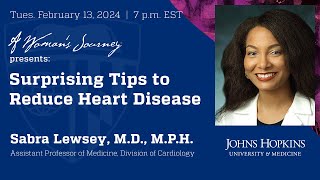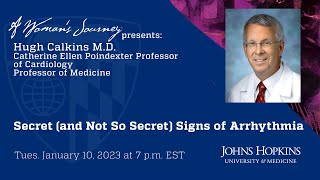Heart and Cardiovascular Videos
The American Heart Association says cardiovascular disease is the leading cause of death in the United States and the CDC reports that over 60 million women (44%) in the United States are living with some form of heart disease.2 Heart disease is the leading cause of death for women in the United States and can affect women at any age. In 2021, it was responsible for the deaths of 310,661 women—or about 1 in every 5 female deaths.1 Research has shown that only about half (56%) of US women recognize that heart disease is their number 1 killer.
National chair Kelly Ripen speaks with cardiologist Dr. Sabra Lewsey outlines the role of genetics and our environment in heart disease and shares surprising tips to reduce heart disease.
Secret (and Not So Secret) Signs of Arrhythmia
Dr. Hugh Calkins is the Catherine Ellen Poindexter Professor of Cardiology and Director of the Electrophysiology Laboratory and Arrhythmia Service at the Johns Hopkins Hospital. He is an internationally recognized expert on catheter ablation, atrial fibrillation, syncope, arrhythmogenic right ventricular dysplasia (ARVD) and arrhythmia management.
High Blood Pressure (Hypertension)
High blood pressure can be life-threatening and is ubiquitous in the U.S. affecting 78 million Americans. The American Heart Association estimates that in African-Americans, high blood pressure often develops early in life and that more than 40 percent of non-Hispanic African-American men and women have high blood pressure. Cardiovascular nurse epidemiologist Yvonne Commodore-Mensah explains the causes of hypertension among various populations; new guidelines; and how to get your blood pressure under control.
New Findings from the American Heart Association
For some people who still suffer from depression that is hard to treat, there’s good news on the horizon. Research is being done for people with severe treatment-resistant depression. Esketamine is a groundbreaking therapy that can provide relief from major depression within hours. Esketamine is made from a drug called ketamine, an anesthetic. Psychiatrist Erica Richards describes who is a candidate for estamine and how it works. Psychopharmacologist Roland Griffiths, director of the Center for Psychedelic and Consciousness Research at Johns Hopkins, focuses on recent psilocybin research for extreme depression, how it is believed to work, risk factors, and ongoing research.




